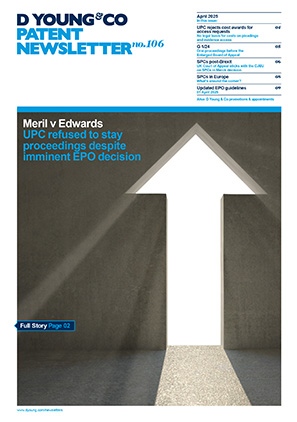Rules of Procedure of the Boards of Appeal: EPO consultation on timeliness of appeal proceedings
The Boards of Appeal of the European Patent Office (EPO) are an independent body to which decisions made by the EPO can be appealed. A large backlog of appeal cases had been building up over several years creating a roadblock to the efficient conclusion of cases.
The Rules of Procedure for the Boards of Appeal (RPBA 2000) came into force on 01 January 2020 with aims to increase:
- efficiency by reducing the number of issues to be treated;
- predictability for the parties; and
- harmonisation.
As part of its drive to improve efficiency and predictability of proceedings before the Boards of Appeal, the EPO has launched a user consultation on further proposed amendments to the RPBA.
Proposal to increase timeliness of appeal proceedings
The goal is for the Boards of Appeal to deal with cases as soon as they are transferred, and to provide users with increased legal certainty by allowing the Boards of Appeal to settle cases more quickly with predictable time frames. In order to achieve this, the proposed amendments to the RPBA aim to modify the procedural framework.
The consultation proposes shortening of the standard period for filing the reply to the statement of grounds of appeal. In cases where there is more than one party, it is proposed that any reply of the other party or parties should be filed within two months of notification of the grounds of appeal rather than four months as currently set by Article 12(1)(c) RPBA.
It is proposed that the Board of Appeal be given the discretionary power to extend this standard period of its own motion, for example, where the proprietor is the respondent and there are numerous appeals by different opponents, the Board of Appeal will normally extend the time limit from the outset. As is the case under the current version of Article 12(1)(c) RPBA, any respondent will be able to request an extension of the period up to a maximum of six months in accordance with Article 12(7) RPBA. A request for extension of a time period will be at the Board of Appeal’s discretion, and must be a written reasoned request presented before expiry of such period.
Under proposed new Article 13(2) RPBA, it is proposed that notification of a summons to oral proceedings is replaced with notification of a communication, under Article 15(1) RPBA (the preliminary opinion), as a trigger for the third level of the convergent approach. This would prevent the triggering of the third level of the convergent approach before a Board of Appeal sends a substantive communication under Rule 100(2) EPC, or under Article 15(1) RPBA, and effectively extends the less strict approach of Article 13(1) RPBA of amendment to a party’s appeal case until later in proceedings.
It is also proposed that Article 15(1) RPBA should be amended to delete the second sentence: “In cases whether there is more than one party, the board shall endeavour to issue the summons no earlier than two months after receipt of the written reply or replies” and to add: “In cases where there is more than one party, the board shall issue the communication no earlier than one month after receipt of the written reply or replies referred to in Article 12(9(c) RPBA.”
The proposed Article 15(1) RPBA guarantees that the third level of convergence will not be triggered before the expiry of one month after receipt of the written reply (the current provision allows the Board of Appeal to apply a shorter timescale). Under the new provision, where there is more than one party the Board of Appeal may only apply a shorter timescale for issuing the communication if all the appellants agree to a shorter timescale.
The proposed amendments to Article 15(9)(b) RPBA add reference to the President of the Boards of Appeal in the context of improving timeliness, so that the President is drawn into the delay in despatching a decision which was not announced orally at the conclusion of oral proceedings.
Transitional provisions will only apply to the amendments to Article 12(1)(c) RPBA as in force from 01 January 2024, and shall not apply to any written reply to any statement of grounds of appeal notified before that date.
The consultation is open to the public, and is active until noon Central European Summer Time (CEST) on 11 September 2023.
Useful link
EPO consultation: dycip.com/epoconsultation

